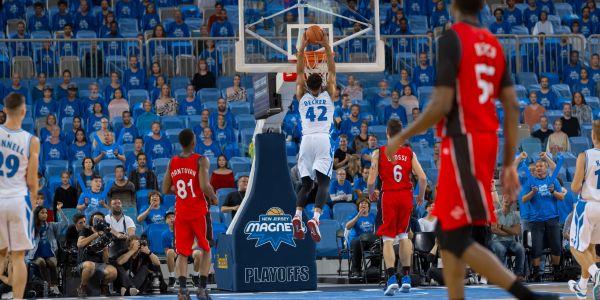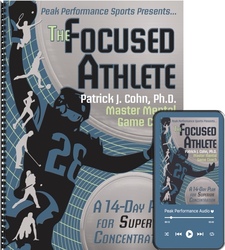
What is Your Biggest Distraction as an Athlete?
The list of potential distractions is exhausting:
- Noisy spectators
- Nagging injuries
- Trash-talking opponents
- Poor playing conditions
- Haters who try to drag you down
- Negative media attention
- Harsh opinions from others
The previous examples are external distractions or sources that originate outside of you. While external distractions are bothersome, they are not the most formidable challenge for athletes.
Internal distractions are much more destructive and difficult to manage, particularly the ‘what if’ trap.
‘What ifs’ are negative hypothetical situations that preoccupy your mind before, during, and after a competition, such as:
- What if I fail?
- What if I let down my coach, teammates, or family?
- What if I get injured again?
- What if I make a few mistakes and I’m benched?
- What if I miss the shot that would tie the game?
- What if I fall during my routine?
- What if I choke in the final minutes of the competition?
The problem is that ‘what ifs’ or hypothetical scenarios are future-based. When you dig deeper, you will notice your what-ifs are fears and worries about potential outcomes. The future is where anxiety resides.
However, the present moment is free from fear. The present moment establishes what needs to be done “now” and the best way to accomplish those tasks. Focusing on the present is the optimal mindset that fosters success and peak performance.
What To Focus On
You can attain a present-moment focus by switching out ‘what if’ thoughts with ‘what now’ thoughts. ‘What now’ thoughts provide clear instructions or directions for achieving your objectives.
For example, a baseball relief pitcher who is trying to close a game with a one-run lead and the bases loaded might experience many internal distractions such as, “What if I blow the save,” “What if I am demoted because I can’t throw strikes” or “What if I let my team down again?”
Each of the previous thoughts is destructive and counterproductive. You can switch your thought process to instructive thoughts by asking, “What now?”
This question helps clarify your focus for the present moment. For instance, “Take a deep breath. Look for the signal from the catcher, “Okay, fastball, low, and away. Check the runners. Throw at the target.”
Asking yourself, “What now?” helps you quickly process your situation, decisively choose a course of action, then follow through. This simple method keeps you mentally engaged in the moment.
Indiana Fever center Aliyah Boston was the WNBA No. 1 overall pick in 2023. When playing, Boston has a “What Now” mentality and directs her attention only to the factors contributing to peak performance.
BOSTON: “Greatness is just being true to who you are but also working hard to accomplish the goals. Every time I step on the court, I expect to be dominant. I go out there every game, and I’m just going to be who I am.”
Hypothetical thinking traps you in an endless loop of negative thinking. When you shed this over thinking, you free your mind to focus on what to do and how to do it.
Get into the habit of asking yourself, “What now?” When you notice your mind fearing what might happen, you can refocus in the moment by shifting your thoughts from ‘What if’ to ‘What now’.
One mindset rule to follow is always focus on what you want to do–make the shot–instead of thinking about what not to do (don’t miss or what if I miss?).
Related Sports Psychology Articles
- How Athletes Cope With Internal And External Distractions
- How to Deal with External Noise
- How to Develop a Clutch Mindset
*Subscribe to The Sports Psychology Podcast on iTunes
*Subscribe to The Sports Psychology Podcast on Spotify
Download a free sports psychology report to improve your mental game!
Learn more about our one-on-one mental game coaching.
The Focused Athlete

It’s probably no secret that you have many opportunities to become distracted in sports. Athletes are bombarded with both internal and external distractions everyday in practice and competition. Focused athletes are able to get the most from their skills because they are more efficient with practice and more concentrated in competition. Athletes who lack focus let distractions run wild through their mind and don’t know how to adjust or refocus.
Athletes who lack total focus feel out of control and can’t get any momentum. Athletes with superior focus feel in control and ready to do battle with the competition.
Which mindset would you rather take into every competition – out of control or mentally prepared? You can empower yourself to take action now. I have the focusing strategies to help you find the zone more often and and stay in the zone!
“The Focused Athlete” is a complete system to teach you how to focus like a champion and harness the power of a zone focus every time you step on the playing field, court, track, or course in practice and games!
